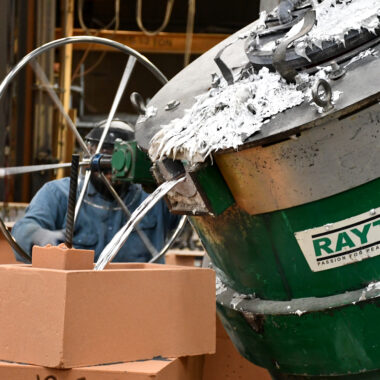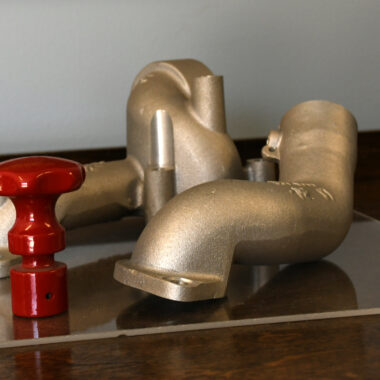Achieving Excellence in Aluminum Casting: Crucial Idea
In the realm of light weight aluminum quality, accuracy and spreading are vital. From thoroughly selecting the best products to developing pouring techniques and guaranteeing meticulous finishing touches, attaining quality in light weight aluminum spreading demands a blend of knowledge and focus to detail.

Products Choice
Picking the proper materials is critical in making sure the success and top quality of your aluminum casting jobs. The option of materials substantially affects the final buildings of the casted products, consisting of strength, toughness, and overall top quality. When choosing products for aluminum spreading, it is essential to take into consideration factors such as the type of light weight aluminum alloy, the desired mechanical properties, and the casting approach being made use of.
Light weight aluminum alloys are typically made use of in spreading because of their light-weight nature and superb mechanical properties. The choice of the particular alloy depends on the application requirements, with options varying from high-strength alloys ideal for architectural components to corrosion-resistant alloys for marine settings. Comprehending the attributes of various light weight aluminum alloys is crucial for choosing the most appropriate one for your project.
Moreover, the spreading technique utilized, whether it be sand spreading, die casting, or financial investment casting, likewise influences product choice. Each spreading method has its own requirements in regards to product fluidness, thermal conductivity, and mold and mildew compatibility. By thoroughly taking into consideration these variables, you can guarantee that the materials selected are tailored to meet the specific requirements of your light weight aluminum casting job.
Mold And Mildew Prep Work
In the world of aluminum spreading, the precise prep work of mold and mildews stands as a critical precursor to the actual spreading process. Mold prep work includes numerous essential steps to make certain the quality and accuracy of the last cast product. First of all, it is important to clean up the mold and mildew extensively to remove any dirt, residue, or previous casting residues that can jeopardize the new actors (casting aluminum illinois). This cleaning process assists maintain the integrity of the mold and protects against flaws in the last product.
Following, using an ideal mold layer is important to facilitate the launch of the actors aluminum and enhance the surface finish of the component. The kind of layer made use of will depend on factors such as the complexity of the mold, the preferred surface area finish, and the casting product. Furthermore, correct venting and gating systems should be integrated right into the mold and mildew layout to permit for the smooth circulation of molten light weight aluminum and avoid the development of air pockets or problems in the actors part.
Melting and Putting Methods
To attain successful light weight aluminum casting, mastering reliable melting and pouring here strategies is paramount for guaranteeing specific and top quality outcomes. The melting process is a vital action in aluminum spreading, where the steel is heated up to its fluid state. It is important to keep track of the temperature level very closely to stop getting too hot, which can result in bad casting quality. Using induction heating systems or gas-fired crucible heating systems can offer specific temperature control and reliable melting.
Once the light weight aluminum reaches the desired liquified state, correct putting techniques need to be used to transfer the steel into the mold and mildews. The rate and consistency of the put are critical factors in accomplishing uniform filling of the mold and mildew cavity and minimizing the danger of problems like air entrapment or insufficient spreading. Gravity pouring, low-pressure spreading, or centrifugal casting approaches can be used based on the details requirements of the job.
Air Conditioning and Solidification Control
Accomplishing exact control over the air conditioning and solidification process is essential in aluminum casting to keep the honesty and high quality of the final casted items. Appropriate cooling and solidification control aid stop problems such as porosity, warm splits, and shrinking that can endanger the mechanical homes of the casted aluminum components.
One essential facet of cooling and solidification control is the style and positioning of cools. Chills are metallic items tactically put in the mold and mildew to soak up warm swiftly from details locations of the casting, advertising consistent solidification and lowering the likelihood of issues. In addition, controlling the cooling rate by readjusting the mold and mildew's product, style, and the application of shielding coverings can affect the microstructure and mechanical buildings of the final casting.
Additionally, tracking and controling the air conditioning process via the usage of thermocouples and computer system simulations enable for real-time changes to optimize cooling rates and solidification patterns. By carrying out these techniques, shops can boost the quality and consistency of their aluminum spreadings, meeting the rigid demands of numerous markets.
Finishing and Top Quality Examination
Appropriately implemented ending up and high quality evaluation procedures are essential in guaranteeing the general integrity and integrity of light weight aluminum castings, constructing upon the read this post here careful air conditioning and solidification control methods employed during the spreading procedure. Ending up techniques such as grinding, fining sand, and polishing help eliminate excess material, smooth rough surfaces, and improve the castings' last appearance. These procedures not only improve the aesthetic appeal yet additionally make certain dimensional precision and capability.

Final Thought
Finally, attaining quality in aluminum casting needs cautious consideration of products selection, careful mold and mildew preparation, specific melting and pouring methods, efficient air conditioning and solidification control, in addition to thorough ending up and high quality assessment procedures. By following these crucial ideas and tricks, suppliers can make sure the production of top quality light weight aluminum spreadings that fulfill sector requirements and client assumptions.
When selecting materials for aluminum spreading, it is important to consider elements such as the kind of aluminum alloy, the desired mechanical buildings, and the spreading approach being made use of.
Moreover, the casting approach employed, whether it be sand spreading, pass away casting, or financial investment spreading, likewise affects material choice.In the realm of aluminum spreading, the meticulous prep work of molds stands as an important precursor to the actual casting procedure. Gravity pouring, low-pressure casting, or centrifugal casting techniques can be utilized based on the particular needs of the task.
